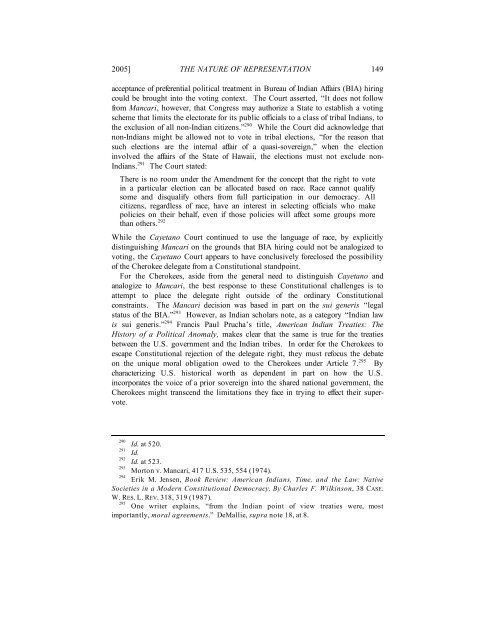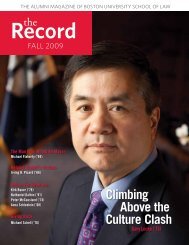the nature of representation: the cherokee right ... - Boston University
the nature of representation: the cherokee right ... - Boston University
the nature of representation: the cherokee right ... - Boston University
Create successful ePaper yourself
Turn your PDF publications into a flip-book with our unique Google optimized e-Paper software.
2005] THE NATURE OF REPRESENTATION 149<br />
acceptance <strong>of</strong> preferential political treatment in Bureau <strong>of</strong> Indian Affairs (BIA) hiring<br />
could be brought into <strong>the</strong> voting context. The Court asserted, “It does not follow<br />
from Mancari, however, that Congress may authorize a State to establish a voting<br />
scheme that limits <strong>the</strong> electorate for its public <strong>of</strong>ficials to a class <strong>of</strong> tribal Indians, to<br />
<strong>the</strong> exclusion <strong>of</strong> all non-Indian citizens.” 290 While <strong>the</strong> Court did acknowledge that<br />
non-Indians might be allowed not to vote in tribal elections, “for <strong>the</strong> reason that<br />
such elections are <strong>the</strong> internal affair <strong>of</strong> a quasi-sovereign,” when <strong>the</strong> election<br />
involved <strong>the</strong> affairs <strong>of</strong> <strong>the</strong> State <strong>of</strong> Hawaii, <strong>the</strong> elections must not exclude non-<br />
Indians. 291 The Court stated:<br />
There is no room under <strong>the</strong> Amendment for <strong>the</strong> concept that <strong>the</strong> <strong>right</strong> to vote<br />
in a particular election can be allocated based on race. Race cannot qualify<br />
some and disqualify o<strong>the</strong>rs from full participation in our democracy. All<br />
citizens, regardless <strong>of</strong> race, have an interest in selecting <strong>of</strong>ficials who make<br />
policies on <strong>the</strong>ir behalf, even if those policies will affect some groups more<br />
than o<strong>the</strong>rs. 292<br />
While <strong>the</strong> Cayetano Court continued to use <strong>the</strong> language <strong>of</strong> race, by explicitly<br />
distinguishing Mancari on <strong>the</strong> grounds that BIA hiring could not be analogized to<br />
voting, <strong>the</strong> Cayetano Court appears to have conclusively foreclosed <strong>the</strong> possibility<br />
<strong>of</strong> <strong>the</strong> Cherokee delegate from a Constitutional standpoint.<br />
For <strong>the</strong> Cherokees, aside from <strong>the</strong> general need to distinguish Cayetano and<br />
analogize to Mancari, <strong>the</strong> best response to <strong>the</strong>se Constitutional challenges is to<br />
attempt to place <strong>the</strong> delegate <strong>right</strong> outside <strong>of</strong> <strong>the</strong> ordinary Constitutional<br />
constraints. The Mancari decision was based in part on <strong>the</strong> sui generis “legal<br />
status <strong>of</strong> <strong>the</strong> BIA.” 293 However, as Indian scholars note, as a category “Indian law<br />
is sui generis.” 294 Francis Paul Prucha’s title, American Indian Treaties: The<br />
History <strong>of</strong> a Political Anomaly, makes clear that <strong>the</strong> same is true for <strong>the</strong> treaties<br />
between <strong>the</strong> U.S. government and <strong>the</strong> Indian tribes. In order for <strong>the</strong> Cherokees to<br />
escape Constitutional rejection <strong>of</strong> <strong>the</strong> delegate <strong>right</strong>, <strong>the</strong>y must refocus <strong>the</strong> debate<br />
on <strong>the</strong> unique moral obligation owed to <strong>the</strong> Cherokees under Article 7. 295 By<br />
characterizing U.S. historical worth as dependent in part on how <strong>the</strong> U.S.<br />
incorporates <strong>the</strong> voice <strong>of</strong> a prior sovereign into <strong>the</strong> shared national government, <strong>the</strong><br />
Cherokees might transcend <strong>the</strong> limitations <strong>the</strong>y face in trying to effect <strong>the</strong>ir supervote.<br />
290<br />
291<br />
Id. at 520.<br />
Id.<br />
292<br />
Id. at 523.<br />
293<br />
Morton v. Mancari, 417 U.S. 535, 554 (1974).<br />
294<br />
Erik M. Jensen, Book Review: American Indians, Time, and <strong>the</strong> Law: Native<br />
Societies in a Modern Constitutional Democracy, By Charles F. Wilkinson, 38CASE.<br />
W. RES.L.REV. 318, 319 (1987).<br />
295<br />
One writer explains, “from <strong>the</strong> Indian point <strong>of</strong> view treaties were, most<br />
importantly, moral agreements.” DeMallie, supra note 18, at 8.









